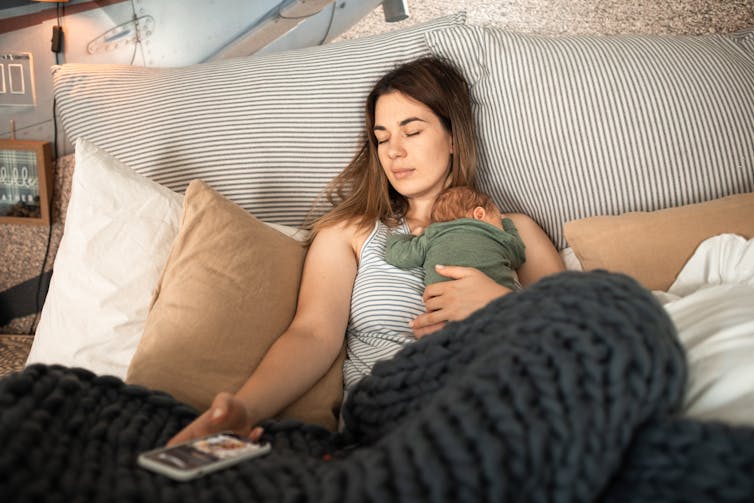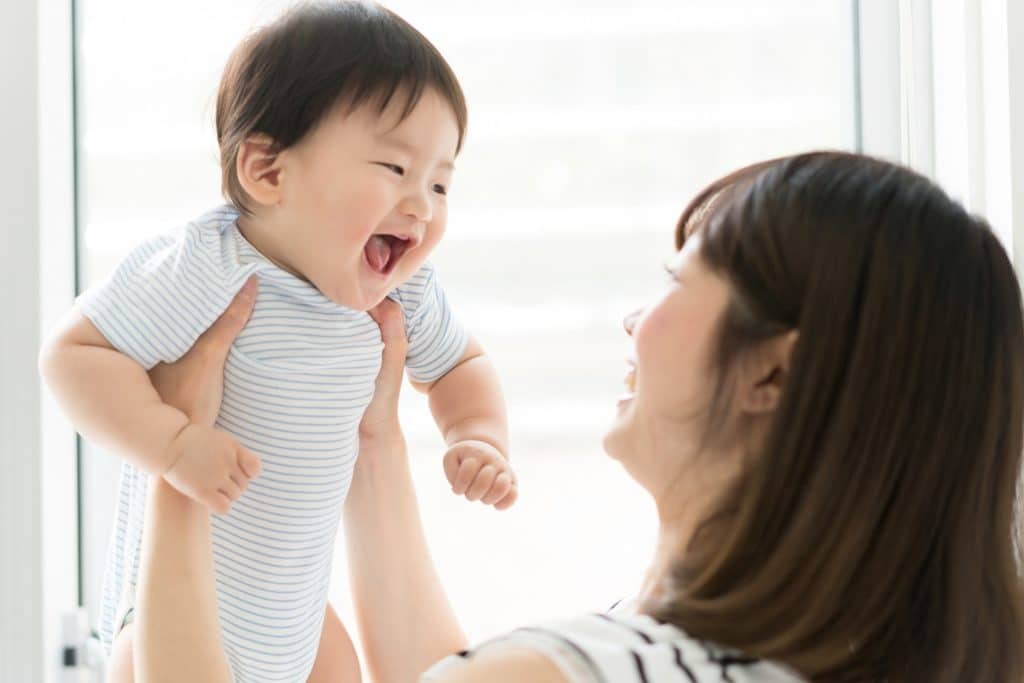For my research into ParentsNext, I circulated a call for interviewees on social media. Slowly, often cautiously, women contacted me wanting to talk. Anxiety pervaded many of these exchanges; reassurances about anonymity were sought, writes Eve Vincent from Macquarie University in this article republished from The Conversation.
For the first two months of Svetlana’s daughter’s life, the pair couch-surfed and lived on the streets. Granted public housing, Svetlana then worked to “stabilise” herself and slowly form “new ties”. A “former addict”, she had been “clean and sober for six years”.
Her daughter faced speech delays, and with help from a social service, Svetlana had been focused on supporting her, deciding to keep her at preschool for an additional year. Svetlana’s father, who has dementia, had lately moved to an aged care facility, leaving her mother “all alone” and “very sick”.
“On top of all this, ParentsNext was introduced to me,” she told me. “I wanted to keep an open mind,” she continued, “and I did.”
Parents as ‘workers in waiting’
The official description of ParentsNext is that it “helps parents with children under six, to plan and prepare for future study or employment”.
The program reclassifies the parents of very young children — initially six-month-old babies and now nine-month-old babies — as “workers in waiting”, who need to partake in monitored activities. Yet their designation is different from and their treatment more ambiguous than that of “the unemployed”.
Participants are required to engage in one of a range of possible activities, and some of these are certainly tied to and compatible with parenting. Attending playgroup and story time sessions at local libraries “count” as legitimate activities.
Paid work is Svetlana’s aspiration, and after a long break since her role as an administrator in a corporate setting, she was “terrified”. ParentsNext seemed to promise a bridge between the past and future.
“The phantom phone call” was how Svetlana referred to it. She remembered receiving an alert: “We’ll call you at this time. And if you don’t answer, your payments might be suspended.” The phone call didn’t arrive at the specified time; her “heart was missing a beat”. Then, at the day’s close, the phone call came, confirming her eligibility for ParentsNext. She was “happy to get help”.
Svetlana repeated, simply and without shame, “I need help.”
In early December 2018, she went to a meeting with her ParentsNext case manager and was “bamboozled” with information about where, when and how to report. Svetlana continued to report to Centrelink, as per the conditions of her Parenting Payment (Single).
She did not realise she had agreed to an additional layer of reporting requirements via a different app; on December 24, her payment was suspended, a common experience of women in this program.
An extension of welfare conditions
ParentsNext’s precursor was the 2006 Welfare to Work policy, which represented a radical change in policies affecting Australian single parents.
Previously, parenting itself was treated as a “legitimate social role”, with minimal conditions attached to the income support available to impoverished parents. Under Welfare to Work, sole parents were essentially “reclassified” as unemployed from when their youngest child turned eight.
ParentsNext waves the wand again, starting when children are nine months old (as mentioned earlier, it was originally six months). As Trish, a single mum, pointed out, “normally you don’t start getting harassed by Centrelink until your kid’s about to go to school or something like that”. For Trish, ParentsNext brings forward harassment’s start date.
I agree with Trish, but formulate it in more technical terms: the significance of ParentsNext is that it represents an extension of welfare conditions to circumstances previously protected from them.
My memory of the six-month, sleep-deprived mark is this: I read somewhere that it was time to start thinking about introducing solid food, which I duly did. It was flung around the room before my baby wailed for the breast. My focus, in other words, was my baby, even if there was more to my life than parenting.
Under pressure to accept that six-month-old babies are still unpredictable and demanding, eligibility for mandatory participation in ParentsNext was changed to nine months in mid-2021.

Is caring a legitimate activity?
By the time Svetlana’s ParentsNext provider reopened in the new year, she had a new case manager. “That lady”, who had seemed “overworked, jaded and cynical” — the one who explained verbally that ParentsNext essentially involved mastering a second reporting system — was gone. Her replacement “apologised profusely”, and together they set to work on a participation plan. Svetlana suggested that her weekly participation activity be, in effect, caring.
So, did it count, she asked her empathetic new case manager, that she looked after her little girl and also caught two buses across the city each way, each day, to visit her lonely, ailing mum? Was caring for others a legitimate “activity”?
“That’s not in our abilities to put it in as an activity,” came the response. As “helpful” as she tried to be, Svetlana’s new case manager — “freshly graduated”, “idealistic”, “you can tell it’s getting a bit much” — still seemed intent on “ticking boxes”.
They agreed, instead, that Svetlana would enrol in a TAFE course that would qualify her to seek work as a receptionist in a medical centre. Yet Svetlana discovered she had become so “unplugged from the system” that self-directed, online study was far more daunting than she envisaged. She floundered. The fragility of her confidence was painfully evident to me.
A sudden health emergency, three weeks before our interview, turned into a “real saga” and had interrupted her efforts at study. She had secured a temporary exemption from ParentsNext.
‘They will go after you’
For my research into ParentsNext, I circulated a call for interviewees on social media. Slowly, often cautiously, women contacted me wanting to talk. Anxiety pervaded many of these exchanges; reassurances about anonymity were sought.
One person, Misha, created a new email account for the purpose of corresponding with me, so concerned was she that her ParentsNext provider might find out she was criticising the program: “They will go after you if your name becomes public.”
I met Eloise in a house set deep in thick, tinder-dry bush. We ate strawberries while a fierce morning heat steadily swelled to fill the kitchen and a high, milky white sky. Within weeks of us meeting, the east coast was ablaze.
Eloise was in pain. A long search for a diagnosis had recently led to the conclusion that she has Ehlers–Danlos syndrome, which affects connective tissue. In other words, she was “too sick to work and not sick enough” for the Disability Support Pension.
When Eloise got that first phone call about ParentsNext, “out of the blue”, she was just “trying to work out what I was going to do with my health”. The caller asked a series of questions about educational attainment and her son’s age.
She then scheduled an appointment for Eloise for the next day, in an outer Sydney suburb that was a two-hour train ride away. “I don’t have a car. I have a toddler and a chronic illness. Like, I don’t know what you expect me to do.”
“I remember very vividly her saying, ‘Why are you crying? We’re here to help you; we’re trying to help you.’” Eloise continued, “I’ve been dealing with them ever since.”
Eloise signed a participation plan, agreeing to go to TAFE to complete her Higher School Certificate. “I wanted to do it anyway,” she reasoned. “In retrospect, I would’ve picked something else so I could go to TAFE without stress and do it at my own pace and not with payments-getting-cut hanging over my head.”
Eloise left school in Year 9 but completed Year 10 at TAFE and remained grateful for the support and understanding she received from TAFE teachers. For Eloise’s single mum, “education was the ticket out of poverty”. Her mum had slowly completed a degree and was now working as a counsellor. The two of them were meant to show the world that “we can do just as good as you can”.
At 21, Eloise became a mum. Like her own mother, she was acutely conscious of others’ judgements: “dumb girls have babies”.
The Ehlers–Danlos diagnosis solved some problems but threw up new ones.
I am not sure how to toe the line between, “Yes, I’m too disabled to get a job, but I am not too disabled to look after my son.”
Looking after him is my priority and has been my life for four years […] I love being a mum!
Me: “What do you love about it?” Eloise:
Oh, he’s cool. My kid’s just cool! He’s really funny […] I like hearing the weird stuff he comes out with.
Parenting, Eloise reflected, is “the first thing I’ve ever felt that I was kind of good at”.

Individual responsibility
Access to income support in the contemporary welfare state is conditional on the development of and adherence to an individualised agreement that emerges via “one-on-one meetings with individual advisers”. The “participation plans” that Svetlana and Eloise signed are an example of these kinds of agreements.
Some frontline workers certainly perceive that empathetic listening and attention is at least the one thing they do have in their arsenal to give their clients, since to assist them to find work when there is not enough work to go around is not within their power. Others go above and beyond to broker work and training opportunities where they do exist.
However, a consistent theme in research into this system is that the coercive work case managers do, in emphasising and enforcing compliance through computerised systems, is more keenly felt and perceived than the supportive work they do. Further, those working these roles in the conditional, privatised welfare system increasingly view their “clients” negatively, seeing them as individually responsible for their circumstances.
Māori foster mother Jo relayed:
So I met her. Her name is [Belinda]. My worker. She got surprised with me that I knew a lot. She liked my questions.
Belinda began to explain to Jo that ParentsNext “is a new government program and … this is how they going to roll it out for …”
Jo “interjected her”:
I was actually telling her that foster carers are exempt from these types of programs and her reply was, “I don’t know that; I need to find out for myself.”
Jo, in other words, knew more about the program than the worker tasked with enforcing its conditions.
While Svetlana perceived that her new, more supportive case manager was a recent university graduate, others sensed that case managers might well have themselves been “sort of quite downtrodden by the system and then now they’re suddenly in this semi-sales position”.
In these cases, when people have “been at the bottom” themselves, there can exist an almost evangelical edge: “I’m going to help people and I’m, yeah, a little bit better than these people because I’ve worked hard and I deserve it.”
‘Relative privilege’ and making the system work
Lallie described to me her first encounter with Australia’s welfare system:
Oh, my God, you have a system?! That looks after you? Geee! I came from war. There is no backup. There was just early insecurity: physical, emotional, psychological insecurity.
Lallie and her family are African refugees who settled in Brisbane when she was 10. Medicare, too, was a revelation.
Lallie completed high school in Brisbane and then went to university. Even before graduating, a path stretched before her. After gaining her degree, she worked in community sector roles in homeless services, sexual health and mental health. She also designed, launched and began running a consultancy on the side.
Her consultancy was just beginning to take off when COVID hit. No more “toxic workplaces”; no more “working with dickheads”. And, most importantly, she could devote more time to her youngest child, who had just been diagnosed with a complex medical condition. “I have to stay close to home. I have to be here more.”
She needed room to breathe. Without a regular income, Lallie found herself on Parenting Payment (Single) and then on ParentsNext.
I interviewed Lallie over the phone. She was articulate, compelling, forceful. I had no trouble imagining her first appointment with her ParentsNext case manager, which also took place over the phone.
Lallie told her: “This is where I’m at in life. My child has these needs.” Lallie insisted that taking her child to appointments be counted as her “participation activity” rather than doing something new. The case manager checked with her supervising manager and then acquiesced.
This was Lallie’s approach: “How do I make this work for me, immediately?” She emphasised:
How do I make this work for me? Because I don’t have time for bullshit. I just don’t have time for Centrelink to be dangling me left and right.
Impressed with Lallie’s plans for her consultancy, her case manager next agreed to upgrade Lallie’s Zoom account and buy lights so Lallie’s work could successfully transition online. Soon, Lallie was back at work, “nice shirt on top” and “pyjama pants on the bottom”.
In Lallie’s words, she insisted this was a story of relative “privilege”. Lallie explains it thus: “I have a background in advocacy. I just advocated for myself.” Lallie is a single mother, a refugee, an African Australian.
We talked of her experiences of racism and sexism: “I don’t always sit in the privilege basket.” I was surprised by her choice of words, but also grasped that Lallie was intent on impressing upon me that she is more than the identity categories I might be tempted to tell her story through.
Lallie sees herself and takes pride in possessing “system literacy privilege”. By this she means that through her work and over time she has accrued deep and valuable knowledge about how to navigate systems of support.
Every time she made a call to Centrelink or a provider, for example, she made notes about whom she spoke to and what was said. She undertook research before meetings and arrived knowing her entitlements, just as foster mum Jo had done. Adept at navigating welfare bureaucracies, Lallie was able to wring resources out of a scenario that only harmed many other of my interviewees.
The indignity of investigation
Historian Mark Peel eloquently describes the “indignity of the investigation” into one’s impoverished circumstances. For some of his interviewees, this was even more painful than the material penury they found ways to endure; they “resented having to passively accept someone else’s interpretation of their problems”.
This is what Arlie told me: she was initially hopeful ParentsNext might support her to attain her driver’s licence, which her first case manager affirmed. The idea was dismissed by her next case manager, whom she met a month later. At a third appointment, with another case manager again, “the lady asked me to tell her about myself”.
Arlie talked. Meanwhile, “she was writing it all down [on] a blank piece of paper”. Arlie is a “young mum”; she is 21 and has two kids. Her partner is an apprentice plumber. “I’m proud of everything I have, although not everyone sees it that way, and I felt quite judged as she wrote down my life story.” Arlie continued, “I don’t know why but I cried about it that night.”
The blank piece of paper being imprinted by another’s pen seemed to me a suggestive image. Arlie’s story was rewritten in that moment to fit a policy narrative about “teen pregnancy”, “educational attainment” and “welfare dependence”. That’s not the story Arlie was telling, nor the story she lives by.
Ayesha, who grew up in Kolkata and holds two postgraduate degrees, enjoys a greater degree of social standing than Arlie: she is highly qualified, speaks of a “career” rather than “work”, which has a more instrumental cast, and has led a transnational cosmopolitan life that shaped the tenor of our rich exchange. It struck me that she held tightly to her own self-imagining, despite attempts at its rewriting.
Ayesha saw herself as more than a welfare recipient and more than a mother, “as much as I love listening to Peppa Pig and Paw Patrol on repeat”. She liked to conjure an image of herself, she told me, “that active, corporate-gear-wearing, you know, Starbucks-holding person who was taking the commute into the city every morning”.
She referred to “that bit of me” and also said, “I’ve lost quite a bit of me.” Ayesha seemed poised to retrieve and foreground the parts of herself she valued. Others I interviewed had their story more strongly subsumed into the process of rewriting.
Yet Eloise, too, who left school in Year 9 and lived with the “dumb girls have babies” story, worked to subtly overwrite the tale of “intergenerational welfare dependence”. As earlier explained, she was raised by a single mother. It was
just me and my mum. Yeah. Just the two of us. Um, my dad kind of came and went occasionally, but it was, it was just the two of us.
She stated, “So I am the next on the line of single parenting.”
It was then that Eloise recast single motherhood from a source of lack to a source of strength. “I respect my mum a lot for raising me as well as she could,” said Eloise. She did her very best “with the resources […] that she had”.
This is an edited extract from Who Cares?: Life on Welfare in Australia by Eve Vincent (MUP), published 21 February 2023.


